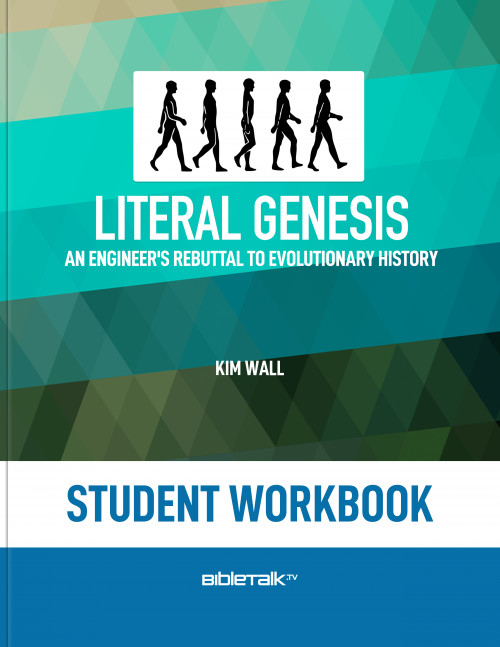Rewinding the Clock!
Welcome back to our next installment of the Literal Genesis series, where we try to hold firmly to Scripture and loosely to theories. I'm asked all the time, what do you mean by that? Can you give me an example? I'll give you one that I haven't used yet. If we think about this idea of Darwinian evolution, particularly the Neo-Darwinian synthesis- the more modern twist on Darwin's theory- and we think about how the media portrays it and how typically science portrays it as so solid, it's so well understood. We know this is how it happened. We know how these single-celled creatures evolved into human beings over eons of time.
In 2016 there was a meeting of the Royal Society, an organization which has been meeting for a long time. In fact, Newton himself chaired these meetings for 24 years. It is a very prestigious organization of scientists. In 2016 their topic for meeting was to discuss the problems with Neo-Darwinian evolution and how they might be overcome. You may be thinking, problems, what problems? If you're a Christian that has discounted the history in Genesis, in order to go with what some scientists say about how life arose, then guess what? You're in a pause right now and you don't even know it. The point is when and if they should come up with something that's more satisfying, you're going to have to change your views on biological evolution. If you just hold firmly to Scripture to begin with, you never have to go through that.
I believe James tells it better than me. He talks about the waves of the sea being tossed around and driven by the wind. He's talking about doctrine. Every new little wind of doctrine that comes in some Christians go with it, and they go with it, and they go with it. We just need to take a step back and be solid in how we approach things.
The Age of the Universe
Today we're going to be talking about the age of things, particularly the age of the universe. I get asked this question a lot and it is an important question. We'll talk about evidences for a universe that is old and evidences for a universe that is young. We'll talk about why it matters. A lot of people say, I really don't care. I kind of fall into that category. It doesn't really matter to me how old things are. But what does the Bible say? Does it give us any hint, any clue? And then we'll talk about why it matters. We'll go to Scripture intermittently throughout. And then I want to wrap it up with how I view this from a biblical standpoint, that I think answers all the questions about the ages of things.
How old is the universe?
So, is the universe old? Is universe young? When it comes to understanding an age of something, you might be surprised to know that there isn't just a standard test you can apply. And this applies to almost anything you can think of. How old am I? How old are human beings? How old are animals? How old are trees and rocks? How old is the universe? There's not a scientific test that we can do, like measuring the circumference of a tree or measuring the height of an object. That's too easy. In every case we find, there's really no scientific test. In fact, ages must be derived. They must be calculated.
Wouldn't it be nice if all we had to do was just a scientific test like a litmus test- the universe is X amount of years old. There's no debate. That's it. No, not so much. In all age calculations there are assumptions. In many cases these are unprovable assumptions. So you have to go into your work before you can even do it. Math is involved. Math is very sound, very solid. So you might think of math as like a black box with a handle on it. And the math inside is just math. It's very solid equations. But on one side of the box you have to feed something into it before you can turn the crank. And it's that information that you feed into it that's the variable, that's the assumptions. And as I've said many times, these are unproven. So depending on where you start with your assumptions, you can put it into the math box, turn the crank, and you'll get different answers.
This is also a problem because we all look at things differently. Two people can look at the same scene, something happening on a street corner and you go interview both of them separately. And you get different variations of the things that were witnessed. It's just the way we are as human beings.
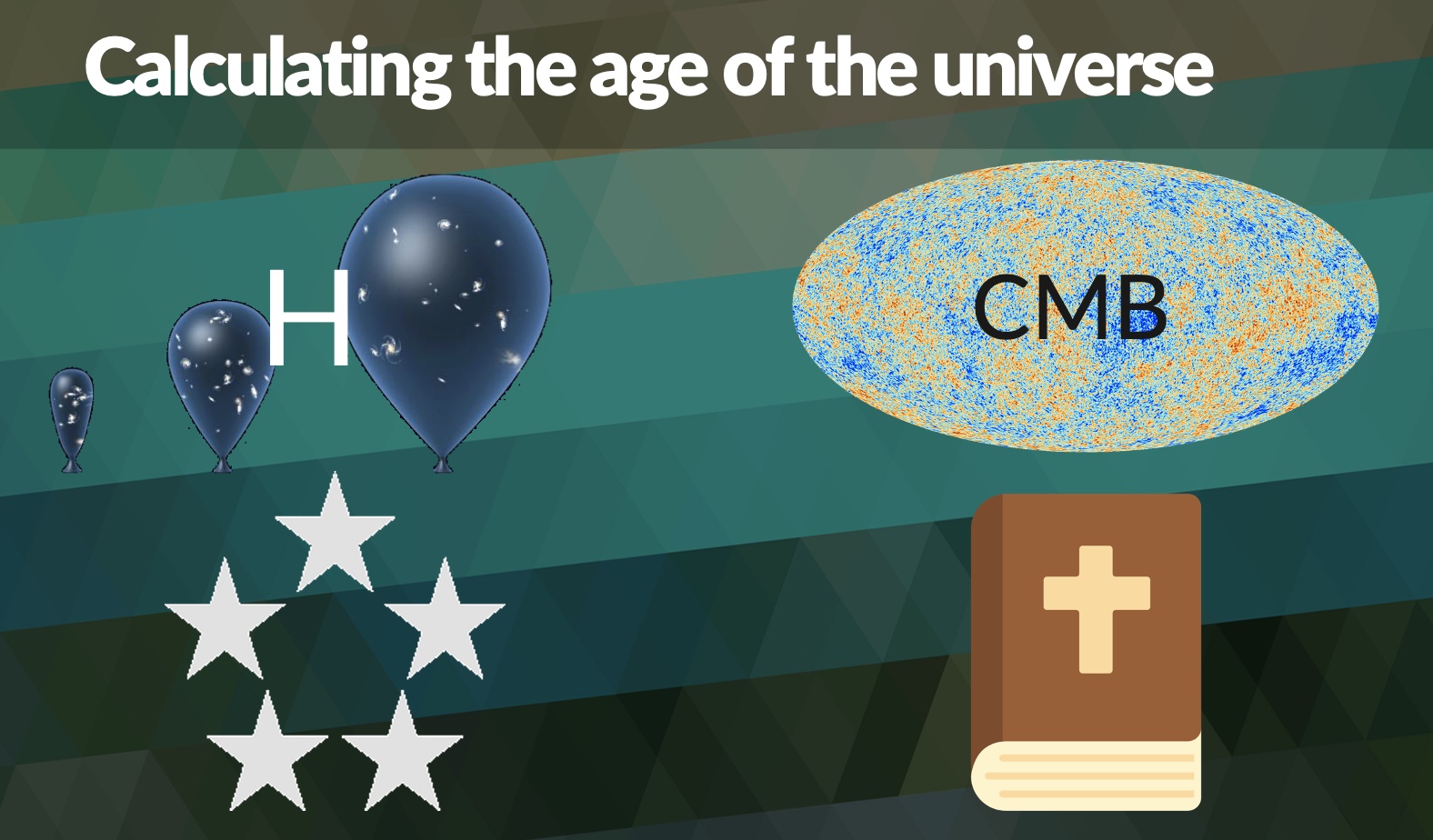
We will briefly run through the four different ways that we can come up with an age or we can derive an age for the age of the universe. One has to do with this "H" in the middle of the balloons, known as the Hubble Constant. Hubble, hopefully sounds familiar to you. There's a telescope named after Hubble out there in space, and it sends back tremendously beautiful pictures of space. We've learned so much from the images received from that telescope. But the idea has to do with the Hubble Constant. That's one of those variables that's on the outside of that math box. Whatever age is, whatever that concept is, it can be different. We fit it into the box to turn the crank. We get an age of the universe and we'll go into a little more detail here in a moment.
The other is looking at the Cosmic Microwave Background Radiation. We call it CMB for short. Scientists discovered, somewhere around the year 2013, this radiant temperature that we can measure throughout the universe, it seems fairly consistent. The idea here is that this is the early temperature fluctuation from right after the big bang. No, I don't believe that. I think there are other ways that we can look at this, the CMB, but this is one method they use. And if you look at the light areas and dark areas, there's a temperature fluctuation between the two. We'll talk more about it in a moment. But again, they plug in some variables on the left. They put it into our math box, turn the crank, and they come out with an age.
The other way is looking at globular clusters. This is pretty logical, we try to find the oldest stars in the universe. It makes logical sense, right? The universe has to be older than the oldest star, is the premise for that.
And then finally, Scripture. Does Scripture even talk about the age of the universe? Unfortunately, not directly. Like any other age calculation, in Scripture, we have to calculate it.
So these are the four ways, primarily, that we can come up with an age for the universe. Let's start taking a look at these.
First, we'll start with this: is the universe old? There's evidence that sure looks like the universe is old. So what is that evidence? I want to start with scripture here, which may be an odd place to start, but I want to start here because I want to concentrate on this word stretch, and be thinking about this throughout the talk today.
Who alone stretches out the heavens
- Job 9:8
And tramples down the waves of the sea;
Job 9:8 says, "Who alone- Who is God. Job is talking about God- Who alone stretches out the heavens and walks on the waves of the sea?" Well, that's pretty obvious. I don't know of anybody else that can walk on water except God Himself, but stretch is what I want to focus on- stretching.
If you stretch something out and you do it at a consistent rate- let's say that I have a piece of bubble gum that can be stretched infinitely. And I'm stretching it at a rate of an inch an hour; after two hours there's an inch longer this way, there's an inch longer that way. After another couple of hours, there's more inches. I can measure this over time. And it makes sense that I should be able to go backwards in time, or, as I like to say, rewind the clock, based on that constant measure of stretch, and go back to a point where I feel like this is where it must have been when it started. This is the time when I think the gum started being stretched. Very logical, isn't it?
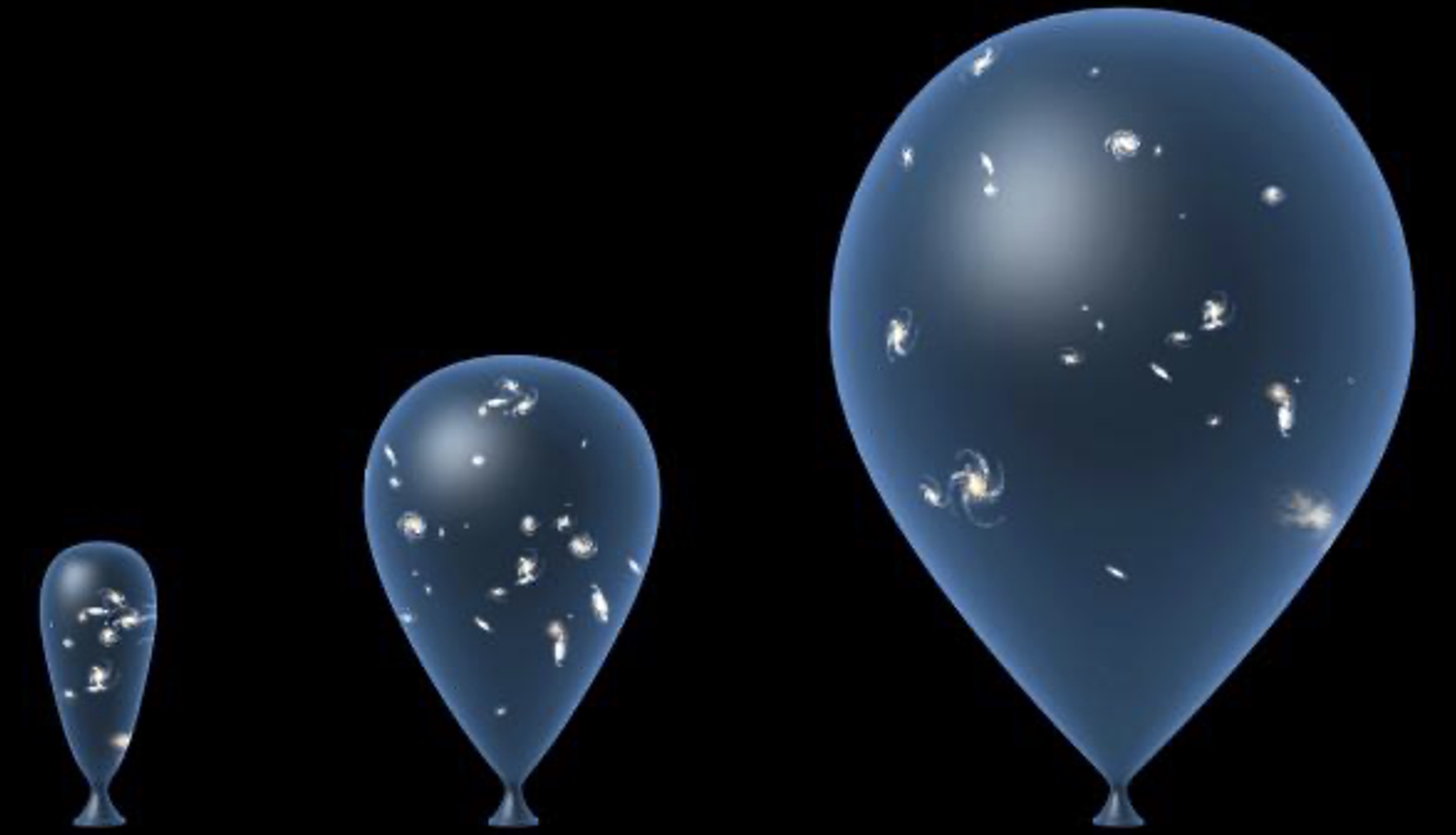
If we apply this to the universe, we can think of the universe as being on the surface of a balloon. Now, this is simply an illustration. There is debate among cosmologists on exactly what the structure of the universe is. But this is one idea- on the surface of a balloon. What happens when we inject air into this balloon? Let's say I have a balloon with a bunch of dots on it. And these dots represent galaxies. Well, as I inflate the balloon, the more air that comes in, the surface expands on the balloon. What happens with my dots? They get further apart, don't they? If I put more air into the balloon, the surface expands even more and I get galaxies that are even further apart. Have you ever heard of the expansion of the universe? This is kind of what that is. And all this rate of expansion depends on the Hubble Constant.
Now, don't let the word constant fool you. It has changed throughout the years. It's a variable. You feed into that math box and turn to crank and you get out an age. So the idea is that over time, just like that gum is being expanded or stretched out- now we'll get into a little more details in a moment about what exactly is expanding and how fast it is expanding, but this is the idea.
Before we apply our rewinding the clock idea to this, I don't want to overlook the fact that this makes it so easy when we talk about the universe and we have such and such many galaxies with so and so many stars- let's not gloss over that. This is very important.
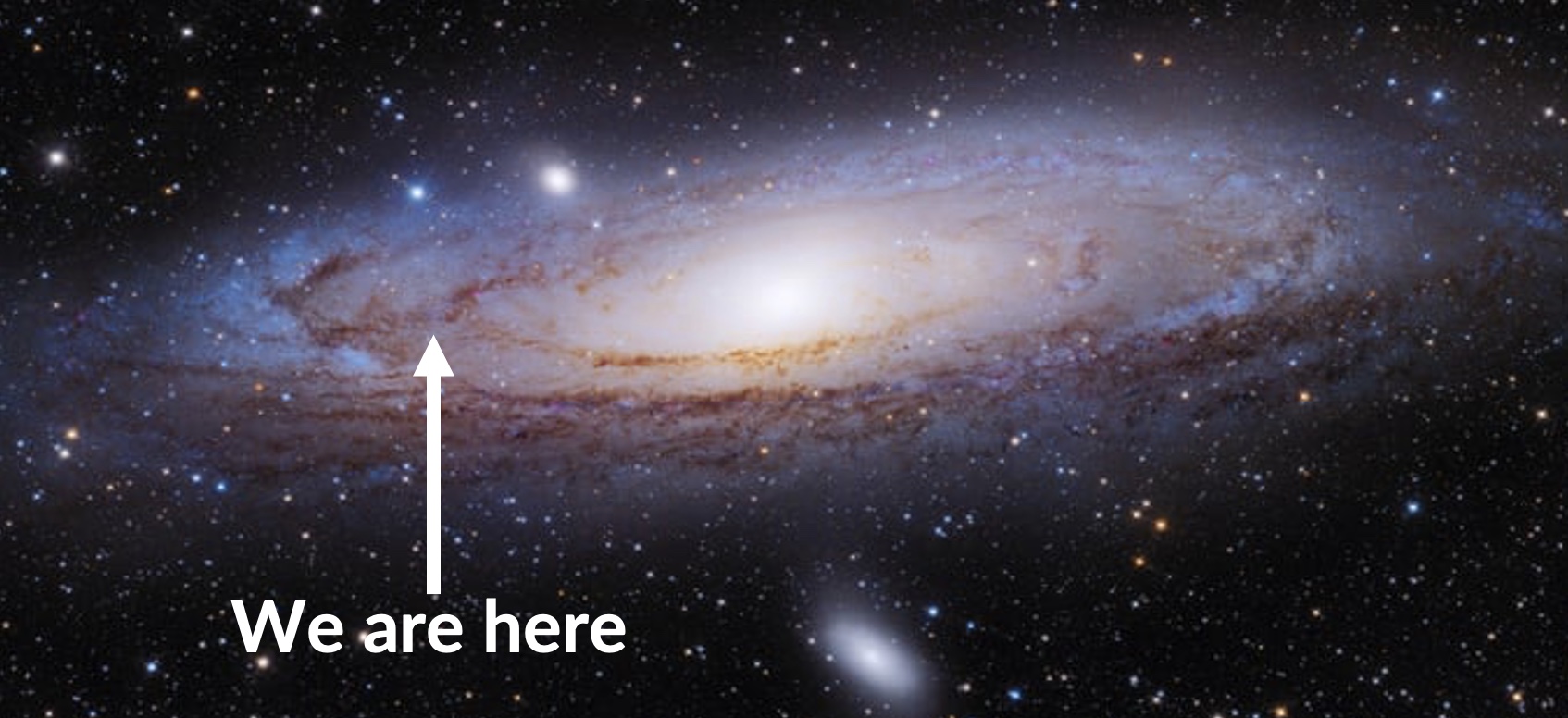
So let's think about a galaxy. This is the Milky Way. I showed this recently to a group of people and afterwards someone asked me, how did we get a picture of our own galaxy? Well, this is a rendition, based on what we think we see from the inside. This is what we think it looks like from the outside. We've never been outside of our own galaxy. Our solar system is about halfway between the galactic center and the spiral edge. We're about halfway in there.
We need to understand the scale of just the Milky Way, our galaxy that we live in. Inside of here there's a solar system, there's lots of them. Our solar system is here. You may not have been alive in 1977, I was. In that year, we launched a couple of spacecrafts: Voyager I and Voyager II, and we sent them on a mission. We primarily wanted to get pictures of the outermost planets in our solar system. Well, it did that. In fact, it started out its journey in 1977. Now, if you think you're a frequent traveler, you're not. Voyager one has us all beat. It travels a million miles a day. That's 35,000 miles an hour. It roughly equals a million miles a day. It's been traveling a million miles a day for 46 years. That's a lot of miles. I don't know what kind of benefits Voyager is going to get for all that travel! Well, where is it? How far has it gone? Is it outside of the galaxy? Is it on the other side of the galaxy? Well, if you think about this pinpoint on this arrow, it's barely left that point- a million miles a day for 46 years.
The next question is, well, is it beyond our solar system? No, it would have to travel another 30,000 years to get outside of the influence of our sun. Is our galaxy big? Well, in terms of galaxies in the universe, scientists believe we have a medium-sized galaxy. There are galaxies even bigger. And when you think- 30,000 years at a million miles a day just to get outside of our solar system. The next question you might ask is, well, how many solar systems are in the Milky Way? Scientists estimate- because we don't know- between 100 billion and 400 billion solar systems like ours, in the Milky Way. Is it a big place? It's unbelievably big. It's almost unimaginable. And now try to imagine there's more galaxies. And the closest one is so far away, we'll never be able to get there to see it. We cannot send a probe that far.
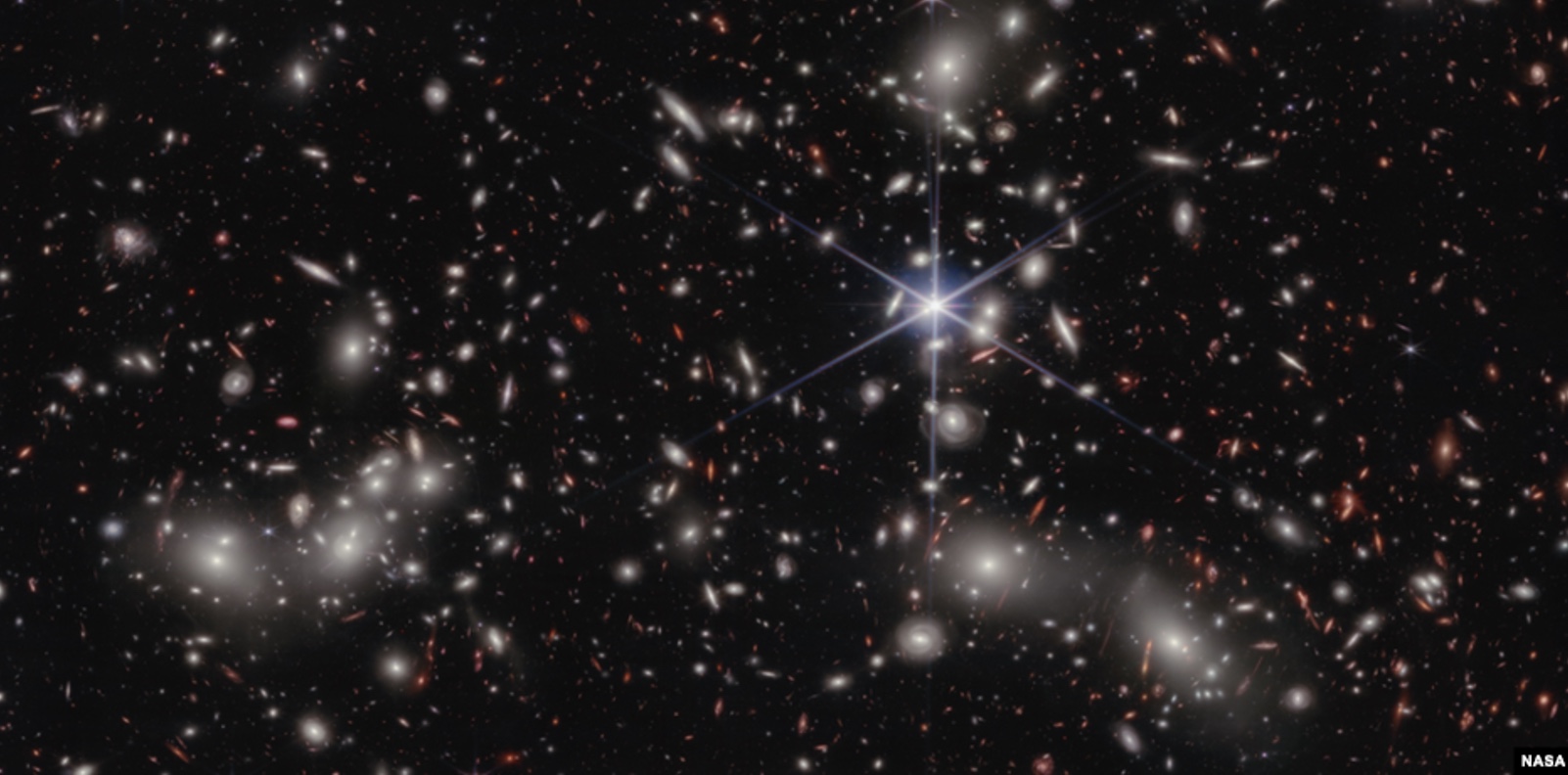
If we take a picture like this of the nighttime sky, you can see these flat disk things. Those are galaxies like the Milky Way. Think about that probe having to travel 30,000 years to get outside of our own solar system in our own galaxy and look at all these galaxies. This happens to represent about the size of a grain of sand. You could hold it up to the nighttime sky and block out the nighttime sky with a grain of sand. And behind that grain of sand, this is what you would see. How many grains of sand can you fill the nighttime sky with? It's almost incomprehensible, the size of the universe and the number of galaxies that are in it.
It makes me feel a couple of things. One, it makes me feel very small. And the other, it makes me comprehend a little bit how big the Creator is. Everywhere we turn our telescope, is just beautiful. Think about the number of stars that are in a galaxy. Well, how many galaxies are there? This number has also changed throughout the years. Has anyone heard of the James Webb Space telescope? We had some ideas before the first images from that telescope. And now those ideas have changed a little bit. Scientists used to believe that there were maybe 200 billion galaxies in the visible universe. We'll talk more about what that means, the visible universe, here in a moment. It is an unbelievably large amount of galaxies. Now scientists think it's upwards of two, three, four trillion galaxies. The universe has all of a sudden become a whole lot bigger thanks to the James Webb telescope and the ability to see further than we've ever seen. In our own Milky Way, there could be up to 400 billion stars. It's unbelievable.
Lift up your eyes on high
- Isaiah 40:26
And see who has created these stars,
The One who leads forth their host by number,
He calls them all by name;
Because of the greatness of His might and the strength of His power,
Not one of them is missing.
I don't know how many stars are in the entire universe, but if we have trillions of galaxies with hundreds of billions of stars each, that's a big number. But it's not bigger than our God, is it? I want to talk about the scale of things before it's glossed over.
The universe is like the surface of the balloon, and that doesn't do it justice, does it? Getting back to our analogy, if the universe is expanding- now, exactly what is expanding, nobody really knows. The galaxies do seem to be moving away from one another, not that they can measure the speed and say, it's coming closer to us. But all the other galaxies seem like they're moving far away. It's not like they are measuring the speed. We're actually looking at the light and we see that the light is stretched as it goes away from us. It gets stretched out. And as it stretches out, it moves towards the redshift end of the visible or invisible light spectrum. They look at this redshift and that's how they determine distance and speed and that sort of thing. There are other interpretations of redshift that we won't get into today, but let's just say that's the right interpretation. It looks like these galaxies are receding away from us. We can measure based on redshift the expansion rate of whatever it is that is expanding because these galaxies can't be moving away themselves. The further away we get out we find that things are moving faster than the speed of light, and physics doesn't make that possible.
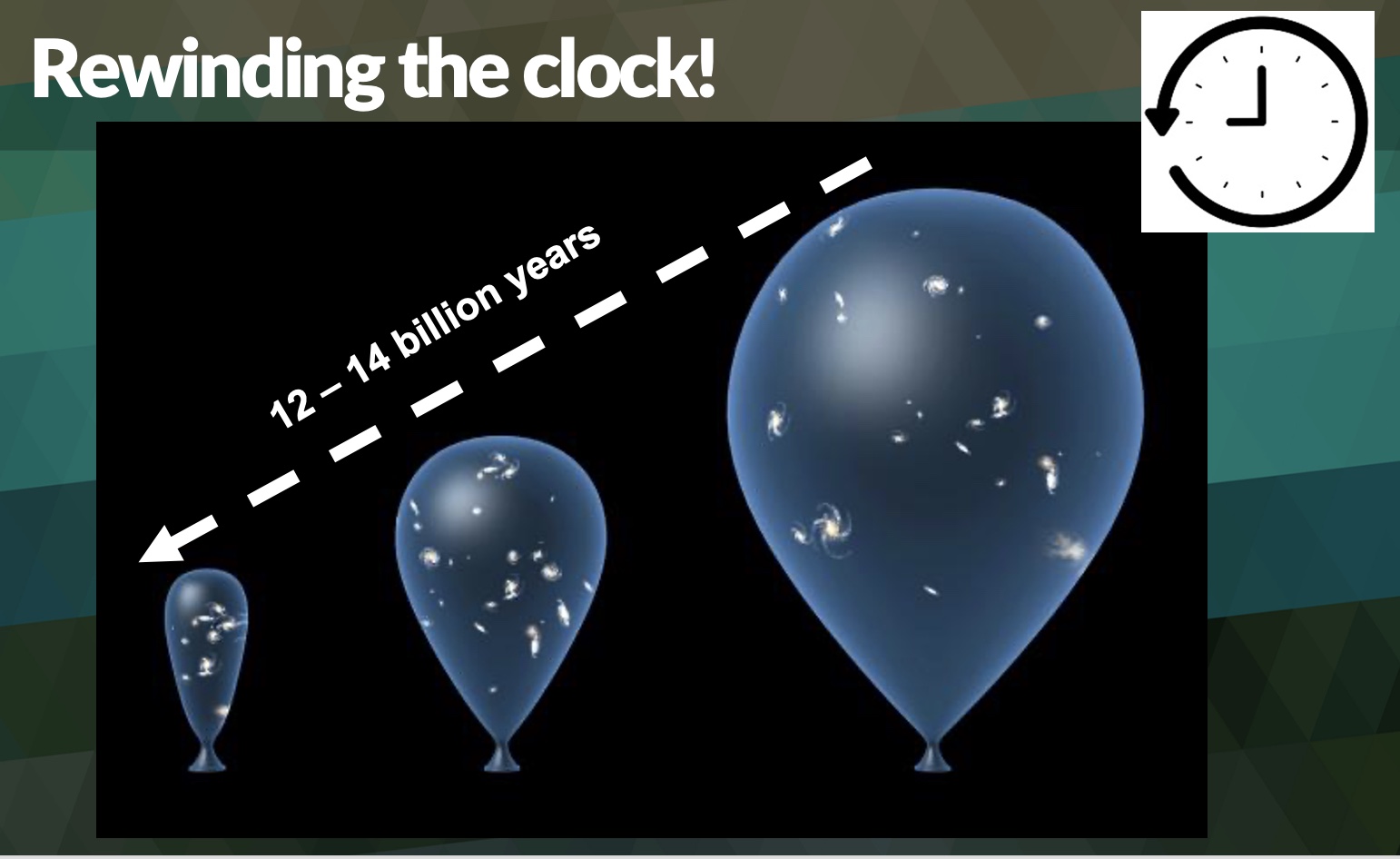
You can't have anything faster than the speed of light. So something, the surface area, whatever it is, is expanding. And if we rewind the clock and we calculate it's this big today, it's expanding at this rate. How far can we go back into the past where it's all together? That calculation is about 12 to 14 billion years. Very logical, right? Like stretching out the bubble gum and then counting backwards to get to when it was in a small state. There's nothing wrong with that at all, except for your starting assumptions. We'll get there in a moment.
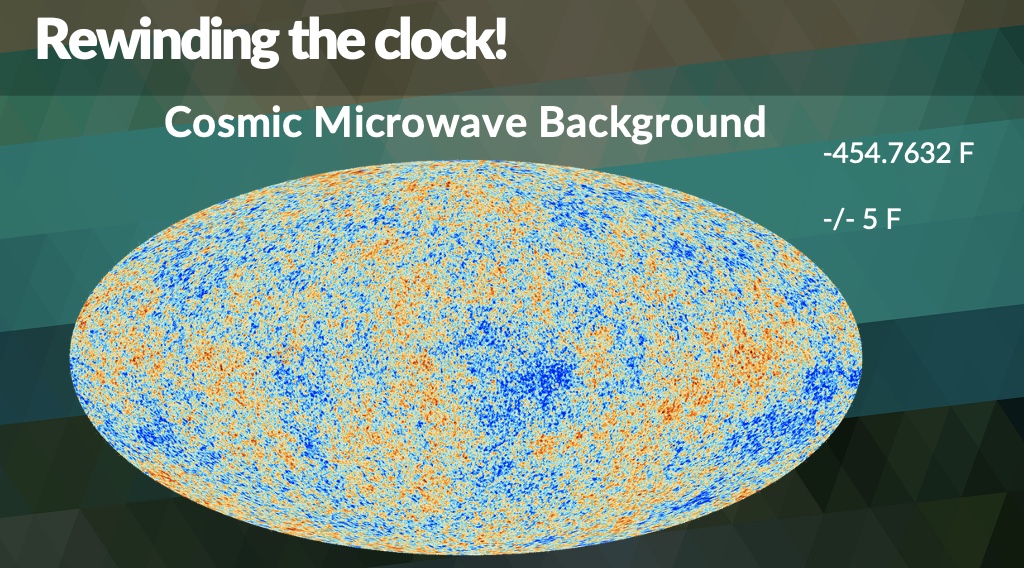
Let us look at Cosmic Microwave Background Radiation. This is measuring temperature. This was recently discovered, in about 2013. There are temperature fluctuations, and they are very minor. Let's say that the brighter areas are warmer and the blue areas are cooler. They look at these fluctuations, these differences in the temperature, and they plug in some variables, put it in the math box and crank it out and they get an age to find out, well, what do they think is the time frame that these differences in temperature could occur? It makes sense. It's still a math problem. You still have a solid math box. You have some assumptions here. You plug it in and you get an age.
Now, what kind of temperatures are we talking about? We're talking about -454 degrees Fahrenheit, very, very cold. What are the differences in temperature? Plus or minus five degrees. So when I say warmer areas, I'm not talking about warm. We're just talking about differences in cold. But it's detectable. We can pick this up and we can measure it. Now, are there other interpretations of what this might be? Because, again, this is thought to be leftover radiation from just moments after the big bang. Yes, there are other interpretations. It's not the only one, but we'll go with that one because that's mainstream. And if you're familiar with CMB, you kind of know that this is what is generally believed.
So what kind of unknowns are we talking about? Because measuring an expansion rate and rewinding the clock, that makes logical sense. Measuring the fluctuations in the microwave background radiation and determining how long it took for them to reach that state, that kind of makes sense as well. One thing is, what about the expansion rate itself? Has it always been constant? How would we know? It appears to be constant today. How do we know that some time in the past- because we're talking about 13.8 billion years or so - how do we know it's always been that constant rate? Nobody knows why or how it's even expanding.
I just briefly touched on the size of the universe. What kind of power would it take to stretch that fabric out? Unbelievable power. They call that power dark energy. It's dark because it's invisible. It's not detectable. No one can see it. You can't bring it in the lab. You can't test it. But they believe it's there nonetheless, because something has to be expanding the universe. This is unknown. We can assume that it's always been constant, but we don't really know. We can't really prove it because the past is the past. We can't redo the past, the current density of the universe. Big bang prediction would predict that there is less dense matter in the universe because it's all being spread out and becoming further and further apart. Yet new discoveries with the James Webb shows that that's not the case. There's even more universes. So the density of the universe is something that's in flux. We don't know. That's one of those variables outside of that math box you've got to feed in so you can turn the crank.
Here's two variables, right? Another one is the composition or the structure of the universe. Is it curved like that surface area of the balloon or is it flat? I know there's probably a joke in here about flat earth somewhere. But yes, there are two competing theories with cosmologists, and it's looking like more and more the flat universe is going to win out because the math works out better with the flat universe. Can we get ourselves outside of the universe to look in, to see if it is curved? Is it flat? No, we can't do that. So we really don't know. That's another variable outside of the math box and that is going to affect the outcome of the age.
Then there's the Hubble Constant or the Cosmological Constant itself, developed by Edwin Hubble in 1929 based on redshift. And this number has changed throughout the years. It's interesting, you take this Hubble Constant and if you give it a higher value, which means it's expanding faster, then the universe turns out to be younger. If you give the Hubble Constant a lower value, it means it's expanding slower. It turns out to be older. See what I'm saying? So don't get hung up on the math. The math is math, but there are assumptions that we feed into the math in order to get a value on the other side and these are things that are hard. We are just little humans on this little speck of dust in this massive universe. And we're trying to figure this out.
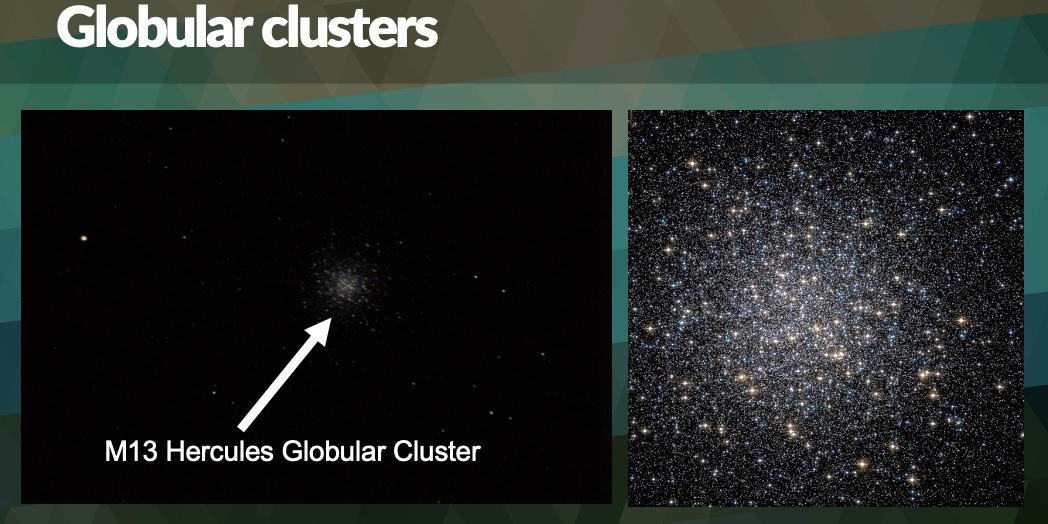
Another way we can calculate or derive the age of the universe is looking at globular clusters. Shown here is the Hercules Globular Cluster. It is faint, a little fuzzy. It looks like a bunch of dots. You can see this with your naked eye on a moonless night. It's really hard to look directly at it. You kind of have to move your eyes left and right once you find it. But you can see it. This cluster of stars is about a million stars. That's not a galaxy. It's just a cluster of stars. The idea here is that these stars are formed at the same time shortly after the big bang. And so if we can look inside here and try to figure out what the oldest star is inside of there, then we know the universe must be slightly older than that. Makes sense, doesn't it? On the right is a more zoomed in picture of the Hercules cluster. It is stunning, isn't it? The better we make our telescopes, the higher resolution images we bring back. The skies are definitely telling of the handiwork of God when you view it that way.
Okay, so how can we tell how old a star is? This gets pretty tricky, but we look at our sun. Our sun is about a medium-sized sun. It's interesting, we live in a medium-sized galaxy with a medium-sized sun in our solar system. It's kind of like Goldilocks, right? There have been books written about this, just how Goldilocks-like our universe and our solar system is. It's more than a coincidence, I believe.
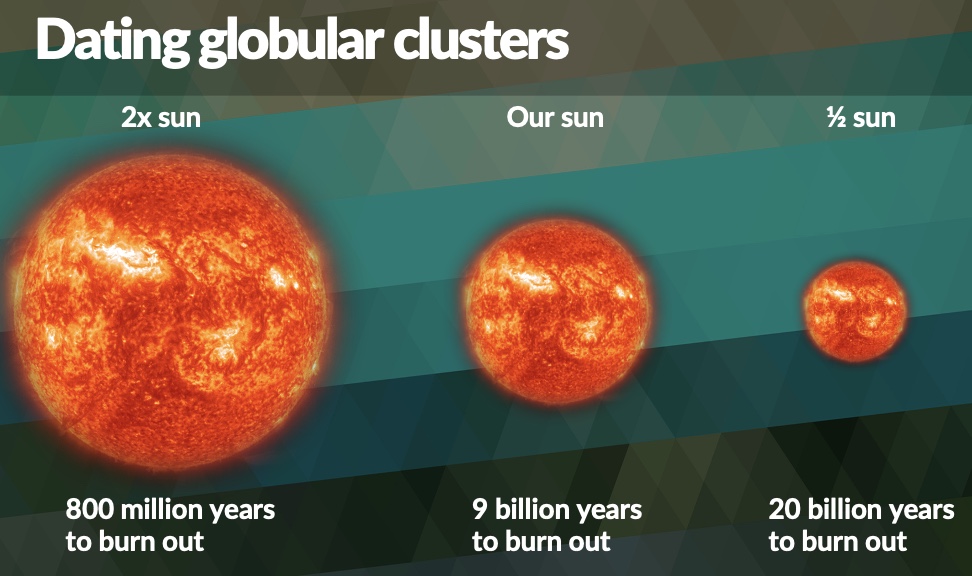
So here's our sun and we can only look at what we see happening today, but we think our sun will burn out after about 9 billion years. Well, it's already four and a half billion years old, so half its life is taken up, its internal ability to fuse and generate heat. It takes about 9 billion years. So if we take a sun that's half the size of our sun, it's like an economy car. It can go longer on its fuel. It takes about 20 billion years. Now, obviously, no one's been around to observe suns burning out over billions of years. But again, based on math and calculations, it looks like the smaller suns take longer to burn out. The bigger sun is twice the size of our sun. They're like SUVs, and they go through their gas quickly. They don't stick around very long.
The idea is, looking at these globular clusters, if we see clusters that have mostly small suns, then that's a clue logically that that's an old cluster. And then we can start looking at the light and the brightness of these stars to determine how far away they are and calculate how old they are. Are their assumptions? The math is math, right. They didn't always get the math right. But the math is pretty solid. What do we not know? We don't know the history, the burnout rate. We only see what we can see happening today. We can't look into the past to see if that burnout rate has changed or fluctuated, if there's any event that causes it to change.
The exact distance to the cluster- redshift is not always easy. We think, if we stretched light out so far- and they give them numbers like a redshift of seven, redshift of eight, redshift of ten, the higher the redshift, the further away or the faster away, faster speeding away from us it is. But then there are wrinkles. And in what we see, we see quasars outside of galaxies, for example, that we think came from the galaxies. But yet the redshifts are vastly different. It's really not as easy as you think, determining the exact distance to the star, the one star out of those millions that we're trying to figure out how far away it is.
And then the other thing is ignorance of stellar evolution. What does that mean? Has anyone ever seen a star form? I did an interesting experiment recently. You've probably heard of Chat GPT and Bard, these large language models. I asked two different models- I won't say which one said what, but I asked one model, have scientists ever seen or observed a star form? And one of them said, No. No scientist has ever seen a star form. Yet we infer based on- here's a list of evidence. The other one I asked said, yes, we see stars forming all the time. And here's the different stages that scientists have observed stars going through. Way different answers. I throw that in there to say, if you're using one of those large language models to do your homework, you might want to be careful, double check your work, because they can vary a lot.
The truth is, no one has ever seen a star form. In fact, the big bang predicts certain types of stars to come out. And there's just the predictions, aren't there? We don't see them. We see stars like our sun. We don't see these generation-one stars, if you will. That's supposed to be predictable from new star evolution. So we don't know. We guess, we hypothesize, we think they come out of these nebula, these gaseous nurseries in the universe, but no one has ever seen it. All we do is speculate. So again, we have unknowns. We plug what we think those are into the box of math and then we spit out an age on the other side.
So what about the young universe? Is there any evidence at all that the universe is young? I would say, yes. There are lots of scientific evidences that throw wrinkles into the old-age analogies. Again, those variables on the side of the box. And depending on what you make those variables, you're going to get a different age out here. Seven evidences- I could have come up with more- that show the universe might not be as old as some think it is.
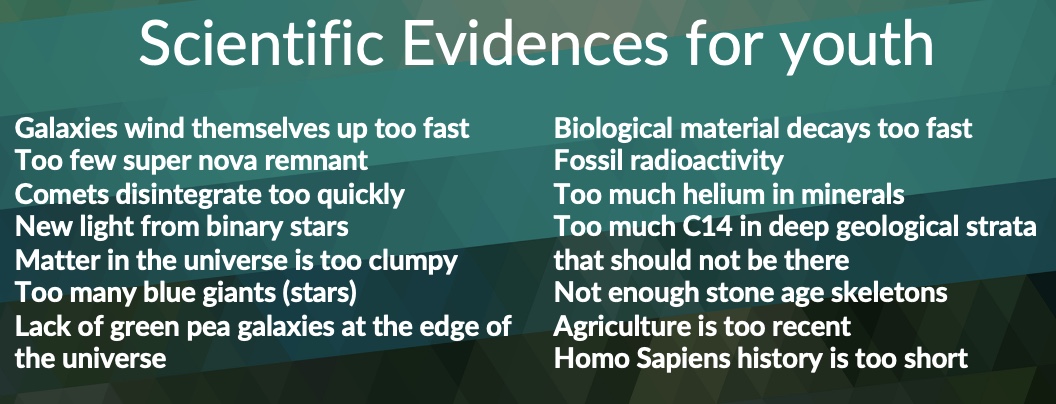
Here's seven evidences about the earth. And these aren't easy problems to solve. But we're not going to talk about these because we're going to look at this from a biblical perspective. There's a lot of controversy here. And again, those variables, it really depends on where you start and what your worldview is. I've talked about some of these before in this series, but let's take a look at Scripture.
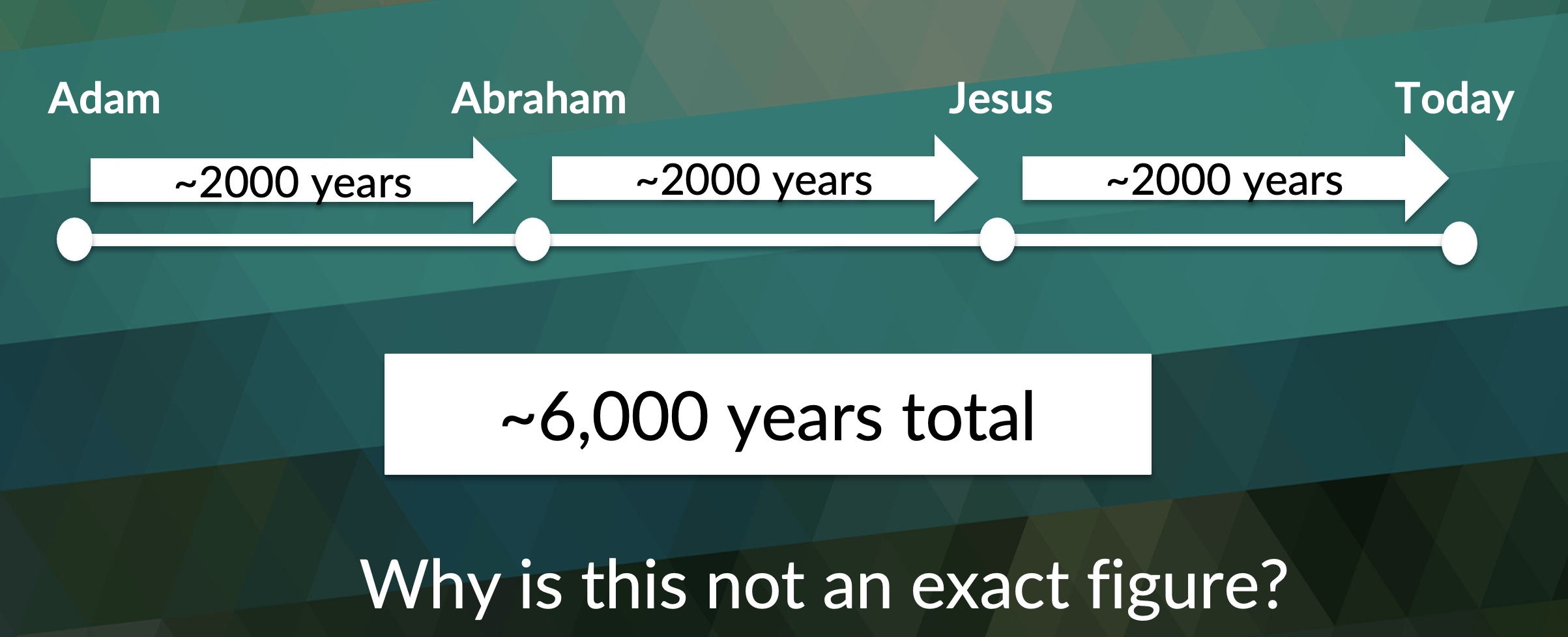
Beginning with Adam, who was the first human being. I don't think anybody would disagree with that. Here's our timeline. If we look at scripture and we look at those things that nobody really likes to read, those genealogies. I remember I was 11, 12 years old. I was reading through Matthew. I just wanted to skip that part. Why is this even in here? It was a great story up until that point: action, adventure, creation and sin. And now all of a sudden, so and so begat so and so. All these children being born in here, it didn't matter to me. I didn't really like it. But this is very important because if we add up the genealogies we get- and I'm giving you an approximation here, that's what this little tilde means, approximately. So this is an easy way to remember it. It's Adam, he was the first living human being. We can count genealogies up to Abraham, that's about 2000 years. From Abraham to Jesus, about 2000 years. From Jesus to today, about 2000 years. This is pretty simple math. I like this kind of math, right? We add these up. What do we get? We get approximately 6000 years old. Make sense now?
Just like any age calculation or derivation there are assumptions involved in this as well. It's not as clear cut as a lot of people think. Why is that? Why isn't it an exact figure? Why do I have this approximation here? To give you one example, Genesis 5:3 says,
When Adam had lived one hundred and thirty years, he became the father of a son in his own likeness, according to his image, and named him Seth.
- Genesis 5:3
How old was Adam when he had Seth, 130 years? How old was Adam when he had Cain or Abel? It doesn't matter, right? This is our bookend. Adam was day zero up to 130 years, and he had Seth, that's the important thing we need to remember. Well, is this an exact age? Does the Bible mean that he had just turned 130 or he was 130 years old and 11 months and about to turn 131? How do we know what we don't know? So you see the variability. Now you might be saying, oh, okay, 11 months. Is that a big deal? I don't think so. But there's an assumption in there. He's 130 years. I don't know exactly where that was. Scripture doesn't tell us. It doesn't need to. That's a detail that just doesn't need to be put in there. In fact, that would be a little strange if that detail was in there. I'm not going to go through all this, but we can take this genealogy, starting with Adam to Shem to Abraham and all the way up to Exodus 12. And we can add these up with some variability in there.
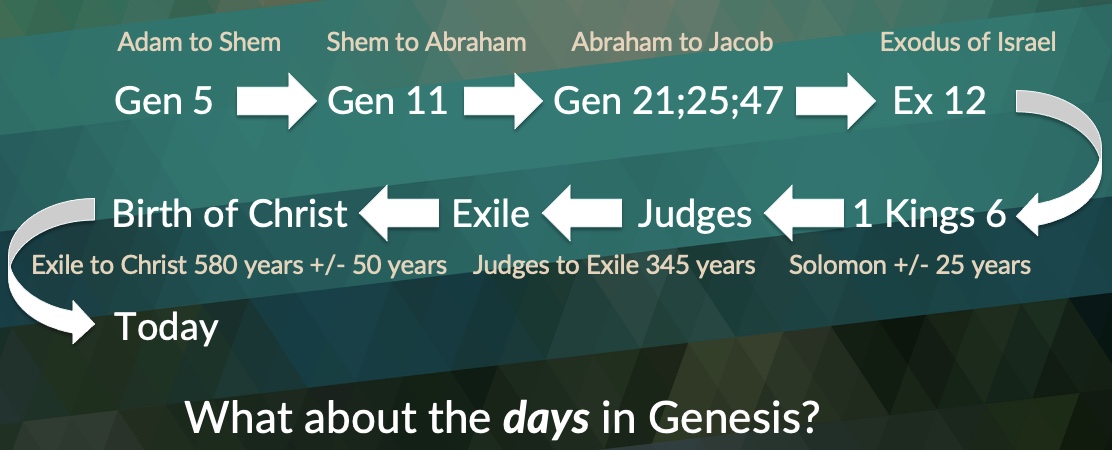
It's not always about the genealogies. The Bible talks about specific time frames as well. In Exodus 12 we have the exodus, the leaving of the Israelites. Then we pick it up in I Kings six, which gives us a very specific time frame about a certain king in a certain year of his reign.
It's nice that that is in there because it makes it flow smoothly. In fact, we read about Solomon to the destruction of the temple. Then we pick it up in Judges through the exile. And again, looking at the reign of the judges and adding this time up, it's not rocket science. It's actually pretty simple. But again, there is some variability in there. There are some unknowns before we plug that into our simple math box. And then we get up to the birth of Christ. From there, I don't think there's any dispute, because our whole calendar system is based on this. Then we have today.
When we add this up we get, give or take, 6000 years. Notice that we have some variability in here, like a plus or minus 50, plus or minus 25. I like to go with plus or minus 200 for the whole thing. Is that a big deal if the earth is 6200 years old versus 5800 years old? It's not a big deal at all, not when you compare it to the accepted age of 13.7 billion years old.
When I talk to other Christians about this, sometimes they say, the days in Genesis aren't really regular days. I've been through this so many times. There's lots of quotes like this from Hebrew scholars. I want to point out this one from Mr. Barr. He says,
Probably so far as I know, there is no professor of Hebrew or Old Testament at any world class university who does not believe that the writer(s) of Genesis one through 11 intended to convey to their readers ideas that: ...the figures contained in Genesis genealogies provided by simple additions a chronology from the beginning of the world up to the later stages in the Biblical story.
- Barr, J., Letter to David C.C. Watson, 1984
Notice the qualifications he's putting in there: Hebrew scholar, the Old Testament, world class universities, credentialed people. There's other quotes from these world renowned scholars that say the same thing. It really looks like the writer of Genesis one is trying to tell us that these were six ordinary days. Why would we try to go through so much effort to make them look like they were otherwise, with the age theory, gap theory and framework hypothesis, and who knows what else is around the corner?
Why would we try to insert so much time into the biblical account of creation? I asked someone this recently and they gave an honest answer. They said, well, it's because scientists say that the earth is 4.5 billion years old. So I understand the genealogies. I understand you're adding them up, but we don't know what happened in creation week. We don't? There was evening and morning, day one. Evening and morning, day two. Evening and morning, day three. I think we know the timescale we're talking about.
Really what it comes down to, when you press deeper in a conversation, Christians really don't want to feel embarrassed just because the whole world has accepted this idea of an old universe, of an old earth. And if we say, it's 6000 years, give or take 200, we look uninformed, don't we? But I have just shown you that these methods of deriving or calculating the age of the universe have starting assumptions. And your starting assumption is going to differ whether you include the Bible or whether you exclude the Bible. I would suggest you include the Bible because the Creator was there. He knows exactly when He did it. He knows exactly how He did it. And by the way, you're not going to get much agreement from secular scientists by saying, well, I agree that the universe is old. Look at the order of events in Genesis. It's so opposite of the big bang. You cannot reconcile the two. So you just have to end up discounting the first 11 chapters in Genesis.
It's not just Genesis, and we've touched on this before, too. I think it was in our second lesson. If we look at Exodus 20:11, in the middle of the Ten Commandments, it's right after the fourth commandment. This is what he says,
For in six days the Lord made the heavens and the earth, the sea and all that is in them, and rested on the seventh day; therefore the Lord blessed the sabbath day and made it holy.
- Exodus 20:11
You can discount Genesis one through 11 all you want and say, God didn't really mean for us to take that literally; it's allegory, it's illusory. Whatever you want to say, you can discount that. But what do you do with Exodus 20:11? God wrote with His own hand, His own finger, the Ten Commandments written in stone and right in the middle of them He's telling them to keep the Sabbath. Six days you have to work, rest on the seventh. Why? Because that's what I did. That's what God did. He created six days. He rested on the seventh. This is where we get our seven-day workweek. There's no other basis for it. It doesn't have anything to do with the moon or the sun or the constellations. This is it. This is the only reference we have as to why we have a seven-day week.
It's not that God created for billions of years and then rested for billions of years. No, He created for six days and He rested on one. Why is that so hard to understand? It's not just Exodus. This is compounded as you go throughout Scripture. Remember, there are hundreds of passages that we alluded to early on that are based on the history in Genesis. The writers thought that was literal, that that was really the way we're supposed to interpret it. So be careful. It's a slippery slope.
Well, why is this even important to begin with? Who cares? I gave this lesson about a week ago, and I started out by asking if anybody knew the age of the universe. Did anybody care? And nobody really cared. And I just want to say, for the record, I could care less how old the universe is. If God did it in 14, 15, 16, 20 billion years versus 6000, I don't care. But what I do care about is anything that sets itself up against something that God has taught us so plainly, I care about that. It's not just the age of the universe. What about the marriage between a man and a woman? We hear one thing from society, right? We get a whole different idea from Scripture. Or what about the idea that Jesus wasn't divine, He was just a man. He's a good man. He did good things. He taught good things, but He wasn't divine. That's against what I read in Scripture. Or how about the one where this life is it? When you're dead, you're dead. There's nothing else. That is not according to Scripture. There is another life. And it's very important what we do here in determining which life we're going to be a part of. So this is why this is important.
We'll look at something Paul says,
for the weapons of our warfare are not of the flesh, but divinely powerful for the destruction of fortresses.
- II Corinthians 10:4
So, first of all, Paul is saying we're in a war. There's a war going on and we have weapons, but they're not physical weapons. Well, do tell Paul. What are you talking about? I've got these weapons available at my disposal for this war that I'm supposedly in. He goes on in verse five,
We are destroying speculations and every lofty thing raised up against the knowledge of God, and we are taking every thought captive to the obedience of Christ,
- II Corinthians 10:5
There are concepts and ideas we hear from society which go directly against what we read in Scripture. And Paul says, we're equipped to battle this. This is not a fleshly battle, but we're equipped to destroy these arguments, knock them down because some of these are very dangerous ideas. There have been many books written about Darwin's dangerous idea. Why is this idea of evolution and natural selection dangerous? There are many reasons for that, but Paul says this is the war we're fighting and this is the reason why it's important.
Ultimately, what is the enemy? Well, it's time. Time is the enemy. Here's a quote from George Wald. He says,
Time is, in fact, the hero of the plot...What we regard as the impossible on the basis of human experience is meaningless here. Given so much time, the "impossible" becomes possible, the possible probable, and the probable virtually certain. One only has to wait: time itself performs the miracles.
- George Wald, "The Origin of Life", Scientific American,
August 1954, p. 48.
We're talking about the beginning of things. When did the universe come into existence? How long ago was that? And even though this is a relatively old quote, this has not changed. It's the same thing- time. Just given enough time, whether you're talking about biological evolution or whether you're talking about the Earth's evolution or the cosmos' evolution- we're talking about three different types of evolution- it doesn't matter. Give all of them time and what may seem impossible to us is possible. Time is the hero. Where's God in this statement? There is no God. In fact, there is no God required in this view. Is that an idea that sets itself up against the knowledge of God?This is directly opposing God.
God said, I did it. It all started with Me. I'm outside of space and time. I brought it all into existence. And this is saying, just give things time, it'll happen no matter how ridiculous it sounds based on our human experiences, is what he's saying. Just give it time. It'll happen.
Okay, well, let's see what Jesus thought about time. And to do that, we'll go to Mark 10:6. Here Jesus is speaking and He says,
But from the beginning of creation, God made them male and female.
- Mark 10:6
Now it's very dangerous to take one verse out and talk about the one verse out of the whole context. They're asking Him about divorce. Is it lawful to be divorced? And He says, Moses allowed you to be divorced because your hearts were hard. But from the beginning of what? Creation. God created, who? Humans, male and female.
He goes on to say,
For this reason a man shall leave his father and mother,
- Mark 10:7
This is clearly talking about human beings. And when you put it all in context Jesus is saying from the beginning of creation, God created them. So really we have a battle of two timelines. One timeline is what we see in Scripture. That's very easy to understand. There's roughly 6000 years from the beginning, when we had the creation of people. A six-day creation event. Jesus spoke these words around AD 30, that we read in Mark, "From the beginning of creation, He created them male and female." And here we are today. Very easy to understand.
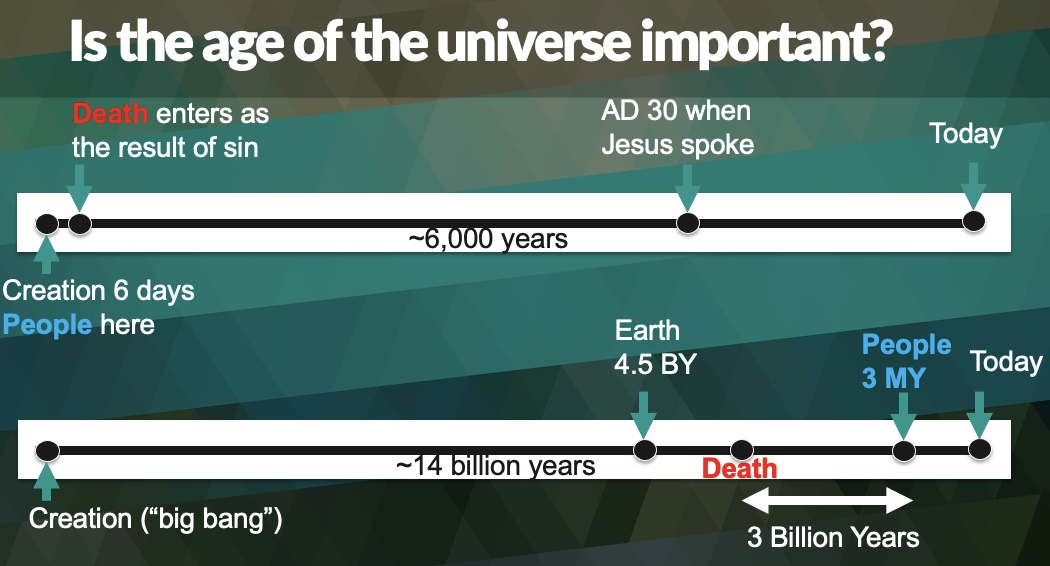
What does the other timeline look like and why should I really be opposed to it? Above we have the secular timeline, the one that doesn't include God. The one where time is the hero and the creator of everything, roughly 14 billion years. Notice the difference of where people are in the timeline. At the beginning of creation- day six, as a matter of fact, is where people were on the first timeline. On the other timeline there are billions of years before we even have the earth, and then there are billions of years before there are people. If Jesus was here and He said, from the beginning of creation, God created them male and female- what sense would that make?
There are no people for billions of years in this secondary timeline. Jesus says, "From the beginning of creation, God created male and female." That makes sense to me. It doesn't make sense for Christians to try and say the earth is really old, the universe is really old, and Jesus didn't know what He was talking about. I don't think that's the case whatsoever because it was Jesus who brought everything into existence. He knows it's not complicated.
The other thing I want to point out here, which is very important, is where death is in scripture, shortly after the creation of these human beings from the beginning where God created them, male and female, they messed up and God told them:
16The Lord God commanded the man, saying, “From any tree of the garden you may eat freely; 17but from the tree of the knowledge of good and evil you shall not eat, for in the day that you eat from it you will surely die.”
- Genesis 2:16-17
In the Hebrew, it's death listed twice: die, die. Which means you're going to start dying and continue dying until you're dead. That's exactly what happened to Adam as a result of his disobedience. So death entered only after everything was created. It wasn't a part of God's original creation. It was a punishment.
On the timeline, notice where death is. Here we had death then people because evolution requires dead ends of living things, starting with those so-called simple single-celled organisms, that started it all three billion years ago. And one branch lived while others mutated themselves out of existence.
And I'll never forget asking a young man this one time, this was before I really got into this type of apologetics. He just hit me with evolution, evolution, evolution. And I was wanting to talk about gospel, gospel, gospel. Don't discount the power in the gospel. I don't know what happened to that young man after the conversation. I still believe there's power in the gospel. That's where the power is, but I finally caved in and said, yeah, whatever, God could have used evolution to bring about life. He goes, what? Your God, who you're trying to tell me loves me so much that He gave His son to die for me, He used the most cruelest method of bringing about life possible? He said, that doesn't make sense to me. That was about 22 years ago, and it stuck with me to this day. He was absolutely right.
The timelines are so different. Does it really make a difference? Let's go back to Scripture and see. In I Corinthians 15, Paul says,
For since by a man came death, by a man also came the resurrection of the dead.
- I Corinthians 15:21
Paul seems to be saying that one man brought death and one man brought life. Well, don't keep us waiting, Paul. Who are we talking about here? He says,
For as in Adam all die, so also in Christ all will be made alive.
- I Corinthians 15:22
So we had this idea that death- even if you discount Genesis and say you can't really believe it, do you believe I Corinthians, where there was no death? Adam brought the death when he disobeyed God and that's why Christ had to come.
What does that do for the gospel? And if you don't remember anything else about this lesson, this is the most important thing. Again, I could care less about how old the universe is or the earth is. I don't believe they're that old. But what does that idea do to the concept of the gospel? Because that's important to me. This should be important to you as well.
So I want to look at the timeline again, the secular timeline, not the biblical one, and just keep in mind death, disease, struggle, famine, cancer. If we look at the fossil record, we find dinosaurs with cancer. We find fish with cancer. We find evidence of animals eating one another. Looking at the fossil record before Adam would have ever come on the scene. Now, can you imagine Adam in the garden, and God says, If you eat this particular tree, you're going to die. This is my interpretation of Adam looking around. Okay, God. Well, it looks like death is already a part of your good creation. Looks like things have been dying long before I came on the scene. Who cares? What's the big deal?
Well, here's the big deal- we're picking up in I Corinthians 15, where we left off in verse 22, we pick up in verse 23,
23But each in his own order: Christ the first fruits, after that those who are Christ’s at His coming, 24then comes the end, when He hands over the kingdom to the God and Father, when He has abolished all rule and all authority and power. 25For He must reign until He has put all His enemies under His feet. 26The last enemy that will be abolished is death.
- I Corinthians 15:23-26
Paul is saying death is the enemy. Can you imagine God using death as a way to bring about life all the way up to human beings? It's the enemy and it's the last thing that's going to be destroyed. That secular view, the timeline makes no sense to me. And when we have this type of view, whether you realize it or not, you're undermining the power of the gospel.
How so? Well, did Christ die a physical death or spiritual death? Most definitely, physical. We talk about the nails being driven. He had a physical body. It was a physical experience. Or why did He have to die physically? If you go all the way back to the garden, God told Adam, the day you eat this fruit, you will die.
Some Christians want to say, well, God meant a spiritual death. Okay, I'm not saying Adam wasn't spiritually separated from God after his sin, but if it was primarily and only spiritual, would Christ have to physically die? That makes no sense at all. Christ came to save us from physical death and from that death creating a permanent separation from God. That's the only thing that makes sense to me.
So this timeline is not only wrong biblically, but it doesn't give you the power of the gospel anymore. It takes the power right out of the gospel because now you have death, which Paul said clearly is the enemy, which is the champion in evolution. Death is the champion all the way up to humans. That's the most important thing I want to cover.
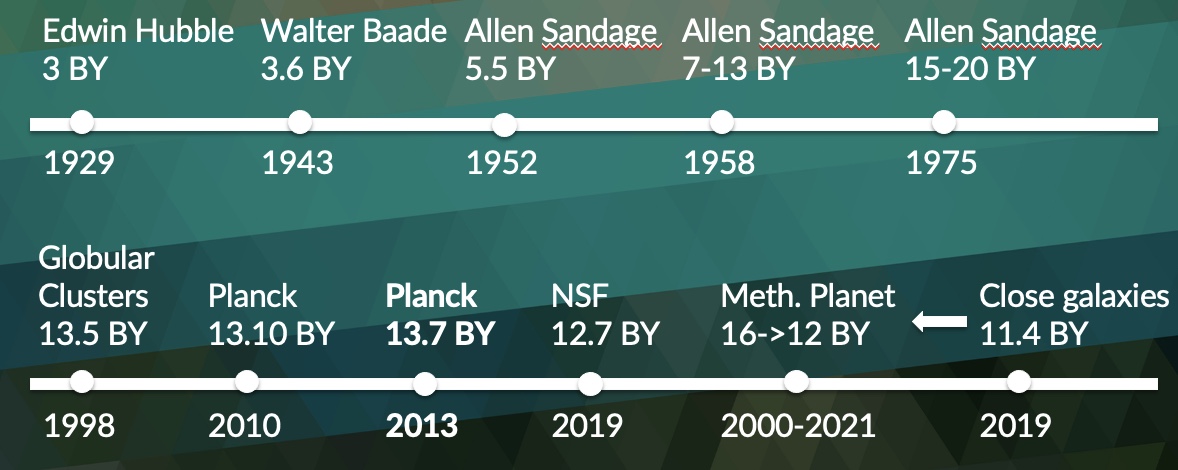
Again, the age of things, how do you know how old something is? It's very difficult. Look at the history of how old the universe has been since 1929. And I started in 1929 because this is where real science comes into the picture, right? This is where redshift was discovered. Now that we know the size of things we can rewind that clock and get a good age. Well, in 1929, that definite age is 3 billion years old. And then every so often it climbs up. In 1975 it's between 15 and 20 billion years old. Not even 50 years later, from 3 billion to almost 20 billion. And then it was bumped down in 1998. When you get up to 2013, this is the number that people generally say 13.77; 13.84 if we round up or round up even more, 14 billion. This was determined by measuring the cosmic microwave background radiation and taking those assumptions, plugging them in the math box and coming out with 13.7 billion.
Notice, it didn't stay there. Just a few years later the National Science Foundation, using other measurements, said it is 12.7. Then from this big range here, from the year 2000 to 2021- in 2000 scientists discovered what they think is the oldest planet in the universe and they nicknamed this planet the Methuselah planet. Where did they get that name from? From Scripture, the oldest recorded living human being. And so this planet, they said, is 16 billion years old. Houston, we have a problem. If the universe is 13.7, how can we have a planet in the universe that's 16 billion years old? That's like me being older than my father? That's a logical impossibility. So for 21 years, they worked on this problem, they worked on this age problem. They whittled it down, whittled it down. Then finally, oh, here's some breathing room. It's 12 billion years old. Really? I mean, if we had an exact scientific way to measure how old things are why does it change so frequently? This one had to change. Obviously, you can't have a planet inside of a universe that's older than the universe itself. But then in 2019- and this is still a problem, it hasn't been worked out- using nearby galaxies and looking at the redshift and measuring that, we've come out with another age of the universe, yet another one, 11.4. Well, now we're back to the Methuselah problem. Even if it's 12 billion years old, it's older than the universe itself again.
I put this up here, not to make fun of science in any kind of way. I love science. I consider myself a man of science. But just to show you that some things are based on assumptions and then put into solid math, turn a crank and out comes a different answer. Be careful here. We hold firmly to Scripture, we hold loosely to theories, because obviously theories change all the time. That's why they're theories.
Well, that's not the only problem. There are other problems with this age of the universe. One has to do with the idea of the big bang, which coincidentally starts with nothing. When I say nothing, I mean nothing. No quantum vacuum, nothing. There's literally no thing the universe came out of. No thing. Cosmologists hate this. Nobody likes this idea. But there isn't anything better. Well, I think I have something better if we're going to bring something this massive into existence. You have to have something that existed here to do it, that's where God comes in. Oh, you're just using God of the gaps theories. Well, now it makes sense if you're going to bring space and matter into time, whatever brings that in has to be outside of it. That's good logic.
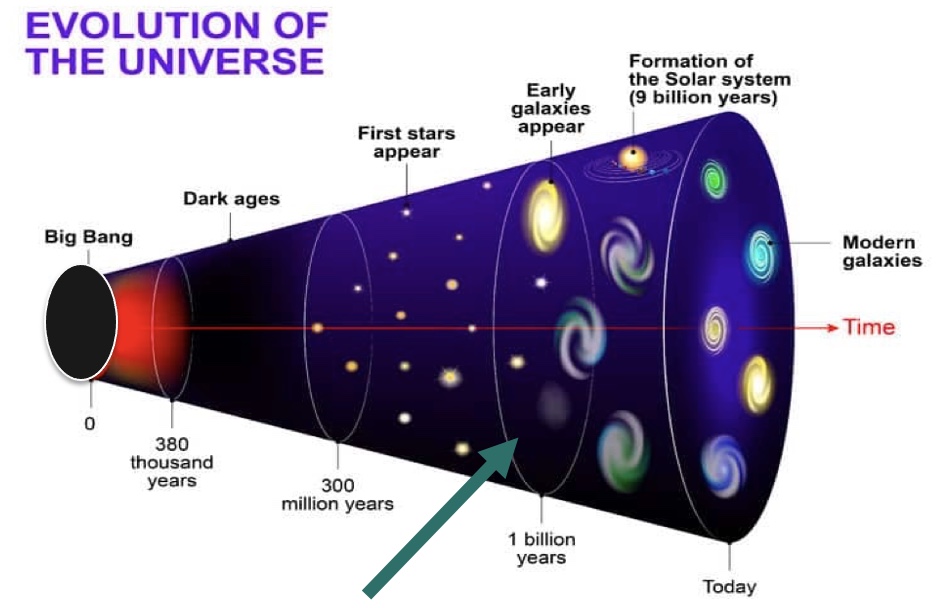
But if we think about this idea of the big bang- and by the way, this represents that expansion I was talking about, the expansion of the universe. So right after the big bang there is incredible heat, then we have nothing and then we had the formation of the first stars. As far as the theory goes- I don't believe this theory. It's totally opposite of what we have in Genesis one, right? According to creation we have the Earth on day one. Earth is way out here in the Big Bang Theory.
If we look further back in time- how do you look further back in time? Do you have a crystal ball? No, we try to find light that's the farthest light that we can detect. Again, going back to the James Webb telescope, it's there in space. It's outside of our atmosphere. So that eliminates some of the fuzziness there. And it's able to see very clearly and detect very faint amounts of extremely redshifted light.
So as the story goes, that light is coming from further and further away. So it must be older, whatever object that is must be older. And here's what it expected to find. It expected to look back in time to see very, very old light from just when the first stars were forming. That's how sensitive it is. It's really a magnificent feat of science, an engineering marvel. It's so sensitive it can see extremely faint redshifted light supposedly from when stars first started to form. Somewhere in here we have first galaxies starting to form. They got excited to see old light that's reaching us, that's so faint. They expected to see these images of galaxies coming together. In other words, disorganized, not yet galaxies. Well, Houston, again, we have a problem since this was not detected by the James Webb. Below, if you don't recognize it, is the Hercules Corona Borealis Great Wall.

This is a structure that is so huge in space, it goes totally against big bang expectations because remember, in early universe, we see small structures and they're just starting or we think this is how the small structures came together first. And if we look out, Einstein said, there's something called this cosmological principle where it should be relatively uniform throughout the whole universe, no matter where you're looking up to a certain size, it should look the same. It's all the same. Earth is in no special spot. Well, not according to Genesis one. We're in a very special spot, but according to big bang, there are no special spots.
And so when this was discovered, this is a massive clumping together of galaxies from only a few billion years after the big bang. Supposedly, this should not be here. This is too big and it's too organized and there are too many galaxies. How big are we talking about from end to end? It's 10 billion light years across. What's a light year? Well, it's the distance light travels in a year. If you take 186,000 miles per second and you calculate how long, how far it can go in a year, that's about 6 trillion miles. So one light year, about 63 miles. This is 10 billion light years across. This is huge. In fact, it takes up 10% of the visible viewing spectrum we have of our entire universe. Ten percent, way early on in the universe's history, supposedly. And this is not the only large structure that the scientists have found. There are several others. This just happens to be the largest and it's so big. It throws a whole wrinkle into big bang expectations, which was discovered in 2013. We can see where it gets its name from, two different constellations. This thing is massive, 10 billion light years across, as I mentioned, 10% of the diameter of the observable universe.
What does that mean, the observable universe? This is absolutely mind boggling. Remember we talked about Voyager and how it's still on that point that we showed in the picture and it would take 30,000 years before it got out of our own solar system? And there are maybe 400 billion other solar systems in our galaxy. We have a light travel problem when we look at the visible universe, which is supposedly expanding and at the edges is expanding incredibly fast. In fact, it's expanding so fast at the edges, the light coming from those galaxies will never get here. We'll never see it. So some are saying that the galaxy now is not 93 billion light years across, but more like 2 trillion light years across. But we can't see it because the light will never get here. It's so far away. How massive is that? And I'm not saying that's a correct view, that's the right view. I'm not even saying that the universe is expanding. It appears to be. Scientists could be wrong about that. But this is just too big to have formed that early in the universe's history. It blows all expectations out of the water.
This is an important quote. It sticks with you because this from a cosmologist, he says,
Cosmology may look like a science, but it isn't a science. A basic tenet of science is that you can do repeatable experiments, and you can't do that in cosmology.
- James Gunn - Eugene Higgins Professor of Astronomy at Princeton University
Science 317:1848-1850, p. 1850, 2007
Isn't that interesting? Now, I have great respect for cosmologists. Cosmology is different than astronomy and what astrophysicists do. They measure things the best they can, redshift being one cosmology takes from that discipline, and they extrapolate it into things like the big bang, things that you can't bring into the lab, you can't repeat. It's a one time thing that happened in the past. And so it's largely speculation.
Here's a guy that's saying, remember that we need to be very careful about this field of cosmology. I'm not saying it's not a science. I wouldn't go that far. It is a field science, but it's not like building rockets. It's not like designing drugs to go into the human body to combat disease. It's not that kind of science. It's a lot different than that kind of science.
Well, why is this such a difficult question? I'll give you a very simple analogy. You walk into a room and see a candle burning. How long has it been burning? Can you know for sure scientifically how long it's been burning? I do this thought experiment all the time with people and it's fun because different people say, well, we can measure the wax at the bottom and then we can rewind the clock, we can measure the rate of burn and the rate of drip and if we rewind that, then we'll know how long it's been burning. But then when you get into the very specific cycle, how do we know no wax has been added or removed from the base? How do we know the rate of the burn has always been the same? There could have been more oxygen in the room in the past and less at other times. How tall was the candle? How big is the wick? There's lots of things that we just don't know. Again, assumptions that we put into our very solid math and we get very different answers. This is why trying to figure out the age of something is very hard. In fact, the best way to know how old something is is to go to someone who was there when that particular thing came into existence.
If you want to know how old I am, you could have asked my parents when they were alive. Well, how old is he? They should know they were there. And they'll tell you. Despite what my driver's license might say or my birth certificate, a reliable eyewitness will know and will be able to tell you.
We don't always have this, do we? But do we have this with our universe? Do we have a reliable eyewitness who was there? We do. If God is anything, He's reliable and He says, this is how I did it. Here's the order of events. Here's how long it took Me. I hate to say, how long it took Me, because I believe He could have done it in an instant. He took six days. And He did that, I think, as an example for us as to how we should pattern our workweeks. We don't need to work 24/7, seven days a week. We need to take breaks and we need to rest.
So to wrap this up, how I view these things- we've looked at evidences for an old universe, we've looked at evidence for a young universe, we looked at why I think the gospel connection is important. Well, how are we supposed to look at this thing? Because nobody wants to look like they're not educated when they're talking to somebody that's highly educated. This is the fear that I come across even with Christian scientists, when I talk to geologists, cosmologists or astrophysicists and they don't want to be embarrassed among their peers and say, I believe the Earth is young. Although, there are many Christian men and women scientists who do believe the Earth is young. Don't get the idea that all scientists think this way.
I think the universe is mature. Well, what do you mean? Let's look at scripture,
Then God said, “Let the earth sprout vegetation, plants yielding seed, and fruit trees on the earth bearing fruit after their kind with seed in them”; and it was so.
- Genesis 1:11
Let's put on our thinking hats for a moment. What day did God create the plants and the trees, that would include the fruit trees? That would be day three. Day three, according to what we read in Genesis one. Adam was created on day six. Well, what did he eat? Now, don't tell me that Adam ate fruit and vegetables, because those things take time to grow. I mean, wheat grows pretty fast, but it doesn't grow in three days. Fruit trees take three to six years to mature before they start yielding fruit. Did Adam have to wait six years before he could eat fruit? No, of course not. Well, let me ask you this. Did God act supernaturally when it came to creating mature fruit trees, mature plants and vegetables for Adam? He must have. If those were created on day three and Adam was on day six, he must have been able to eat those right away, not have to wait years or months even. That wouldn't have worked. So God must have acted supernaturally to mature these parts of creation.
Let's look at another example.
God created man in His own image, in the image of God He created him; male and female He created them.
- Genesis 1:27
Lovely poetic phrase here. Again, put on our thinking caps. What did Adam look like? Did he look like a newborn baby? Did he look like a toddler, a teenager or an adult or an elderly man? Well, I think everyone would agree, based on the hints we have in Scripture, one being God spoke to him, God gave him a language. Adam communicated with God. That couldn't be a baby or even a toddler. Adam was able to reproduce. Definitely not a baby or toddler. So, maybe in the teenage years or young adult years? Adam was to rule over the animals. He had a job to do. He had a task. He could understand how to do these tasks. So I would say that he was probably an older teenager or a young adult, young twenties. Do I know that for sure? No. But did God do something supernatural here when He created Adam as a mature adult? Well, He must have, or Adam wouldn't have been able to be ready to do these things immediately.
What about Genesis 1:14?
Then God said, “Let there be lights in the expanse of the heavens to separate the day from the night, and let them be for signs and for seasons and for days and years;
- Genesis 1:14
God made the two great lights, the greater light to govern the day, and the lesser light to govern the night; He made the stars also.
- Genesis 1:16
What is the purpose of these lights? One, to give light and the other so you can keep track of things. A counting system, constellations, great for keeping track of the calendar of the moon, right? And He made the stars also. I love how God just threw this in through inspiration when Moses was writing this down.
Remember the vastness of the universe we've been talking about, how big even our own solar system is? Thirty thousand years that this Voyager, traveling at millions of miles a day- it'll take that long to get out of our solar system. It'll run out of fuel in about 2033, 2036. It'll never make it out of our solar system. It won't even make it out. The universe is huge. Oh, yeah, He made those.
Wouldn't you love a little more detail here? This is the power of our God. And by the way, most of the stars that we see at night if we go to a really dark place in the world and look up and we see this vast uncountable number of stars, most of those are right in our own galaxy. They're not outside of our galaxy. Most of them are right here, but they're light years away, meaning it would have taken years for their light, traveling at today's observable rates, to get here. How could they reach Earth without taking billions of years? Do you think God did something supernaturally there, because they were there for Adam right away. These were created on day four. Adam was created on day six. Adam could have looked up and seen the splendor of God and started using the constellations right away to start keeping track of things. God must have acted supernaturally.
What about Genesis 1:9?
Then God said, “Let the waters below the heavens be gathered into one place, and let the dry land appear”; and it was so.
- Genesis 1:9
Now we're back to day three. We're kind of moving around a little bit. So day three, He separated the waters from the land. And notice the use of the word dry. It was dry. It was ready. How long did it take the earth to cool from a molten state before dry land was ready for life? I'll give you a second to think about that. I hope you understood that's a trick question. The Earth was never in a molten state. From Genesis 1:1 we have the earth. And what do we have? We have water. We don't have a molten heated state on the earth. We have an Earth that's cool. It already has water on it right there from the very beginning. And by day three, it was ready not only to separate the water from the land, but day three was also when He caused the vegetation to sprout up. Did God do something supernatural here?
It normally takes rocks a long time to form, especially when we're talking about those basement rocks like granite and those sorts of things. Other rocks form very quickly, like volcanic rock. I've actually watched volcanic flows, stood ten feet from them and just watched them cool and develop a crust over them. But that doesn't happen with granite we don't think, or marble and those things like that. They take a long time. So did God act supernaturally to bring these rocks to a state that they would be ready to support soil by day three? He must have.

There is a point to where I'm going here, just bear with me. So we looked at four quick examples and it looks like in every example, God had to do something supernatural. This is a duh moment. There was nothing, then there was something. Only God could bring something from nothing to begin with. We're talking about supernatural events. But specifically during creation it was supernatural, supernatural, supernatural, supernatural. And here's the clincher: no modern dating method is going to be accurate that doesn't take this into account.
We can date a rock radiometrically. We can look at the radioactive isotopes. We can look at the ice microns and plot them out on a map. And we can do all these very scientifically-sound, mathematical box experiments. But if we don't take into consideration that it was something supernatural that brought them into existence, we're going to get the wrong date on the other side.
Now, when it comes to dating rocks, that's a whole other lesson we get wrong. We get dates that are wildly variable. But even if they were all the same, we use four different methods on the same rock and we get the same exact result every time. If we don't take into account that God supernaturally brought those rocks into existence, we're going to be wrong.
And by the way, there are rocks that we have observed coming into existence, Mount St. Helens blew its dome off in 1980. Ten years later, they used very sound scientific radiometric dating to date the new dome that had fully hardened. They got dates widely ranging from hundreds of millions to 1.1-1.2 billion years old. The rock was ten years old. If we can't get dates right for the rock we know the age of, how can we trust the ages that we don't know. Regardless of that, even if it was scientifically sound and accurate, everything gave the same date, if we don't take this into consideration, we're going to get the wrong age.
Now, to drive this home a little further, I'll use an illustration. You're from another universe- there's no evidence of that. We don't get that idea from Scripture. But let's say there's another universe and you travel from there to earth on day seven. The six days of creation just happened. On day seven, you're in the garden with Adam and Eve. How old would you say Adam and Eve were now, looking at them and looking at their ability to take care of the garden? They communicate and do the work that God had them to do. Maybe you would say early twenties? You would be wrong. They were one day old, both of them. By the way- you can think about this after the lesson- did Adam and Eve have belly buttons? Chew on that for a minute.
What about rocks? You see the rocks laying around. Whatever kind of rock it is. How old would you say the rocks were? Would you say they were billions of years old? Because it takes a long time for rocks to go through the decay process and produce other elements. You would be wrong. They're just a few days old. From day one, when we had the earth to day seven, the most they were, was six days old.
What about the light from the galaxies looking up at the nighttime sky- which must have been splendid for Adam to see without any light pollution. To see everything as God had put it there originally must have been beautiful. Well, if you're from another universe, you're going to be more intelligent.
Well, we know light travels at a certain speed. If you said, these galaxies are billions of years old, you would have been wrong. They were created three days ago, on day three. You see how using your modern know how, your modern intellect, no matter how scientific it is, trying to date things that God supernaturally brought into existence during creation week, you're going to be wrong every time.
Now, I want to show you an example of what I mean here. I think the video that follows this can give you some perspective. Going back to the vegetation, remember Adam, on day six, I believe fully he was able to eat plants and vegetables and fruits. What else was he going to eat? He couldn't eat the animals. Meat wasn't sanctioned until after the flood. God says, I give every green grass to you and to the animals. That's what everybody ate back then. They were all vegetarians.
And He says,
Then God said, “Let the earth sprout vegetation, plants yielding seed, and fruit trees on the earth bearing fruit after their kind with seed in them”; and it was so.
- Genesis 1:11
So now I want to focus on this word here, sprout vegetation and King James says, "to bring forth." Now we have different words in the Hebrew. I'm not a Hebrew scholar, but I am able to look up a word and get the general idea. But when God uses different words, they have different meanings. Let there be light is a different word, then bring forth vegetation.
They're very closely related in terms of creation and creating something. But if we think about this idea of to sprout, to bring forth. Imagine day three, you're from that other universe, you're observing and you hear God, Supreme Creator, say, "Let the earth bring forth, sprout vegetation." (video 1:20:50) This is the process, I imagine, taking place at this point. Where He didn't just say boom and things appeared fully grown, that they went through a maturity process. In fact- this is me, this is Kim speaking- if you were to travel there on that day and you were to look at trees, fruit trees with this beautiful fruit on them, cut one open, you would see tree rings. I think God brought them into existence in a mature state. I don't think He was trying to fool anyone. I think He brought everything into existence in a mature fashion. It makes sense.
Back to the light, because it always comes back to the light, it always comes back to stars and distant galaxies and how massively far away they are. And yet their light is here. Light travels fast, but some of these galaxies we see are billions of light years away. In other words, it takes light, as fast as it is, billions of years before it could get to our medium-sized galaxy, our Goldilocks galaxy, if you will. So let's go back to this idea. Now, remember, early on, we kept talking about this idea of stretching, we started out with that word, the verse in Job, that God stretches out the heavens. What is he talking about there? And I'm not saying this is exactly what God was trying to tell us. I'm not saying it at all. But here's what scientists believe. We have all these galaxies, and notice these cross lines here. Consider these lines the fabric of space. So the galaxies seem to be sitting in something. Now, this is a two dimensional drawing of it.
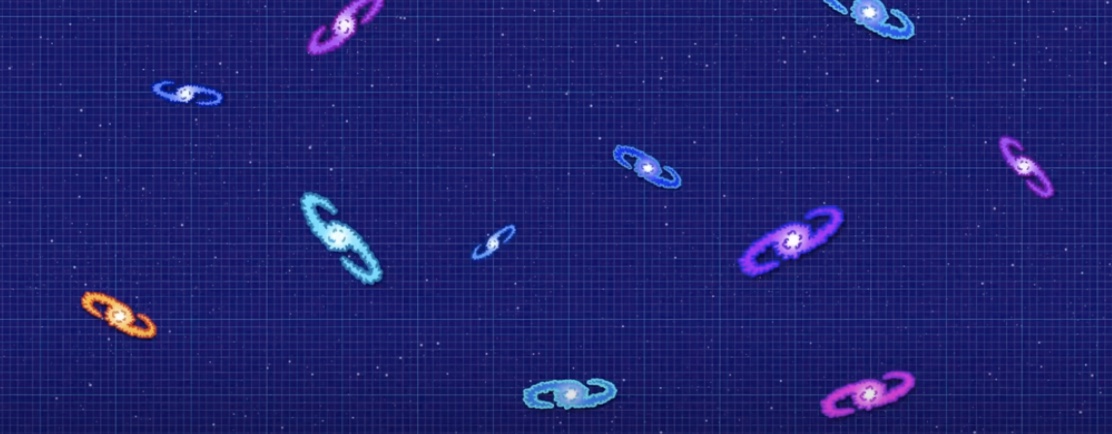
This fabric is all around. What is this fabric? Nobody knows. What is it made of? Nobody knows. But it's believed that there is a fabric of space, that things are literally in. And if the universe is expanding and say this is the Milky Way and these galaxies all seem to be going away from us based on redshift- again, we could have a weird interpretation or wrong interpretation of redshift. Let's just say it's right. There is some debate among scientists on that. But let's say these galaxies are speeding away from us. Well, how fast are they speeding away? Near us, they're speeding away at a rate of about 45,000 miles per second. That's pretty fast. However, the further out we get, the faster they're speeding away from us. The longer their light is stretched out into the red spectrum. If you think about stretching something like that bubble gum and you're moving pretty fast, that makes sense, that the outer edges are moving faster than the inner part of the gum. So this the best analogy I can think of at the moment.
I'll show a little video here (video 1:24:00) to show that as the fabric is being stretched out, not that these galaxies are moving away from us that fast, but they're sitting in a fabric and the fabric is moving away that fast. And the further out we go, the faster it gets. So 45,000 miles per second, relatively close to us, we go out- what they call a megaparsec. Now, these numbers are so big, they had to invent new language like astronomical units and megaparsec. Because you can only write ten to the so much power, so many times, it is easy to start over and say one astronomical unit, one megaparsec. Way, way out here, the fabric is moving faster than the speed of light.
Nothing in the universe can travel faster than the speed of light. But this fabric, whatever this fabric is, it's free to travel as fast as it wants. If the interpretation is right and things are getting further and further apart out here on the edges, things that are moving away faster than the speed of light, that means the light they emit back towards Earth will never get here because it has expanded out so far. That's why some scientists are now starting to say, there's the visible universe, 93 billion light years across; and then there's the stuff we can't see that the light will never even get here. Whether that's true or not, I don't know. I believe either way, according to Scripture, because God is massive enough to do that. So what is the stuff that's being stretched and how is it being stretched?
Well, it's being stretched by dark energy. Nobody knows what dark energy is, but they believe it must exist because of the expansion. And it must be super powerful to move these massive galaxies at tremendous speeds.
Seventeen times in the Old Testament God gives us this imagery, this idea that He stretches out the heavens. Could God be trying to tell us something? I'm not saying all 17 verses have to do with the expansion of the universe. I'm not saying that correlation is necessarily there. But like the one in Isaiah says,
It is He who sits above the circle of the earth,
- Isaiah 40:22
And its inhabitants are like grasshoppers,
Who stretches out the heavens like a curtain
And spreads them out like a tent to dwell in.
That's interesting. Back in Isaiah's day, they already knew the earth was round, right? Compared to the size of just our own solar system, our Milky Way, we are so small.
And we have this idea 17 different times in the Old Testament. And this is the way my simple mind works. We have this unbelievably large universe. Nobody knows exactly how big it is. But again, going back to the Voyager- 30,000 years, just to get outside of our own sun's influence. Trillions of galaxies potentially. Only God would have the power to do this, to make this happen on such a grand scale.
Why would God tell us this over and over again if He hadn't provided some kind of evidence that He's doing it? Would I be fine if scientists came back and said, oh, we've misinterpreted redshift. Things really aren't speeding away from us like we thought, it's something else. Yeah, I would be okay with that. I'm just saying that we have these clues in here that just might- whatever you think on the subject- be telling us how amazingly powerful our God is. That the universe is nothing, the heavens are nothing to Him. He can step right into them like He's stepping into a tent. He's that powerful. And I think that's the bottom line that we need to get out of that.
Then Colossians 1:15-17 says,
15He is the image of the invisible God, the firstborn of all creation. 16For by Him all things were created, both in the heavens and on earth, visible and invisible, whether thrones or dominions or rulers or authorities—all things have been created through Him and for Him. 17He is before all things, and in Him all things hold together.
- Colossians 1:15-17
I talk about dark matter and dark energy. We didn't talk about dark matter. That's another invisible thing that nobody can see. You can't detect and you can't measure it. You can't put it in a lab. But yet they believe it's there because the universe seems to be missing a lot of matter. There should more matter, but there's not. According to big bang ideology, there should be more matter.
According to creation, why would I expect more matter? God made it the way it is. And that's the way it should be. So what if scientists discover dark matter and dark energy one day? What does that do to your biblical way of looking at things? Nothing. Absolutely nothing. Why? Look in this verse, "All things were created through Him," talking about Jesus. "He's the first born in the heavens, on the earth, visible, invisible." If there is such a thing as dark matter and dark energy, and it's somehow found out to be true, that's great. I know who created it. I know who put it there.
And he goes on, "All things have been created through Him and for Him." And this is key: "He is before all things. And in Him, all things hold together." There are things in physics which boggle the mind, how things can stay together when we think they should be repelled apart. But yet there they are. There He is before all things.
You can believe in the big bang. If you're a Christian, you can try to reconcile that with Scripture if you want. That's totally up to you. I don't think God's going to say on Judgment Day, because you believed in a big bang you're not welcome here. I don't think that's the way it's going to go down. But we need to be careful about what we think and what we hold firmly to. The only thing that makes sense is there was something before there was matter and energy and that something is Jesus. And He's the only one, God's the only one with enough power to bring it all into existence out of absolutely nothing at all. That makes sense. Big bang, something from nothing, makes zero sense to me.
Going back one more time to this quote,
Cosmology may look like a science, but it isn't a science. A basic tenet of science is that you can do repeatable experiments and you can't do that in cosmology.
- James Gunn - Eugene Higgins Professor of Astronomy at Princeton University
Science 317:1848-1850, p. 1850, 2007
Let's be careful where we put our faith and hold firmly to Scriptures.
So what did we look at in this lesson? Well, the universe looks like it could be young. I believe the universe was created mature and no matter what dating method that you use, especially on rocks that we didn't see form, that we think were here on the early earth, we're going to get it wrong. It's a supernatural event. We're not going to be able to get the right dating method on there unless we consider a biblical worldview to begin with.
And then the most important is when you buy into the long ages of time, because, time can do anything. Time can do anything God can do right? Just give it enough time. Then you've got this idea of death, disease, struggle, famine, cancer and things eating each other all throughout the history of life up until the first human being. And now you've undermined the very reason for Christ to come in the flesh and die a physical death. The only thing that makes sense is that death came after God's very good creation.
I appreciate your attention. Thank you.



